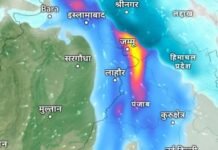In a dramatic escalation of Bangladesh’s political crisis, former Prime Minister Sheikh Hasina was handed the death penalty on Monday by a special tribunal in Dhaka. The International Crimes Tribunal of Bangladesh (ICT-BD) convicted the 78-year-old leader *in absentia* for what it termed “crimes against humanity” committed during the violent crackdown on student-led protests in July last year.
Hasina, who has been living in India since August 5, 2024 – the day her government was toppled amid mass unrest – had earlier been declared a fugitive by the Bangladeshi court. Security was heightened around the tribunal as the judges read out the verdict that could change the political trajectory of Bangladesh for years to come.
According to the judgment, the prosecution successfully established that Hasina directly authorized the use of deadly force against unarmed demonstrators during the protests that swept the nation between July 15 and August 15, 2024. The tribunal cited multiple testimonies, classified reports, and video evidence to argue that the orders from Hasina’s top office triggered a brutal state response that left scores dead.
A United Nations human rights office report previously estimated that nearly 1,400 people were killed during what has come to be known globally as the *July Uprising* — one of the deadliest political agitations in the country’s history. Students, activists, and ordinary citizens had flooded the streets demanding sweeping reforms and an end to authoritarian practices alleged under Hasina’s administration.
The tribunal held Hasina responsible not only for sanctioning lethal force but also for making “provocative and inflammatory statements” that further escalated tensions. The court said that the former prime minister had enabled operations that resulted in the killing of several students in Dhaka, as well as in neighboring districts.
Legal experts in Bangladesh say that while Hasina’s sentencing marks an unprecedented moment, the political implications will be far more complex. Her supporters argue that the process was politically motivated, initiated by forces that benefitted from her ouster last year. Meanwhile, human rights groups have expressed concern over the fairness of the proceedings and the potential fallout in an already polarized nation.
The Bangladesh government has not yet issued a full official statement on the verdict, but sources indicate that security forces are on alert amid fears of renewed unrest. Opposition groups have welcomed the judgment, calling it a step toward justice for those killed during the protests.
With Hasina continuing to reside in India, diplomatic observers say that the verdict could also weigh on New Delhi-Dhaka relations, particularly if Bangladesh seeks her extradition. India has so far maintained a cautious silence, emphasizing that it is monitoring developments closely.
As Bangladesh navigates one of its most volatile phases, the tribunal’s verdict has opened a new chapter — one that could redefine the country’s political legacy, the accountability of its leaders, and the future of its democracy.





